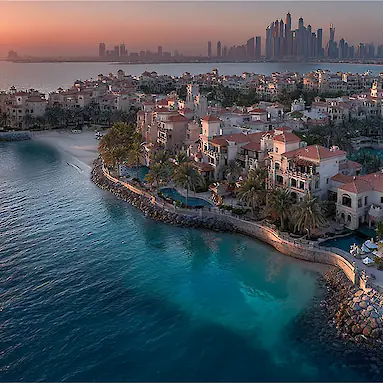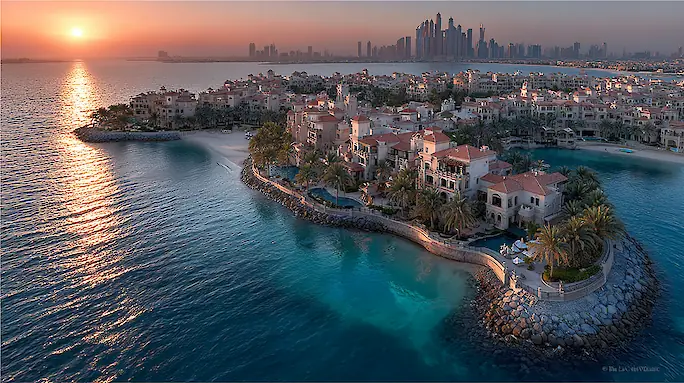How to enjoy iftars, stay within the law, and see a city you won’t find in ordinary months.
During Ramadan, Dubai—the city of the future and perpetual hustle—truly hits pause. During the day, skyscrapers stand still in sultry languor, and the bustle gives way to an almost meditative calm. But as the sun sets, the city explodes with thousands of lights and a special, festive energy. It’s a time when Dubai sheds its veneer of luxury and reveals its true face—a vibrant hub of Arab culture. But is it worth visiting Dubai during Ramadan? Will everything be closed, boring, and complicated? Let’s answer right away: it’s worth it, if you’re ready for a new experience. This isn’t a time of total restrictions, but rather a period of unique opportunities: a chance to see the real, non-touristy city, taste dishes prepared only once a year, and witness age-old traditions gracefully woven into the rhythm of the metropolis. This guide isn’t just about “getting through” Ramadan; it’s about making the most of it while following the rules and having fun.
Part 1: The atmosphere and cultural code of Ramadan
The tourist’s main fear: Is it allowed to eat, drink, and smoke during the day?
So, here’s the key Ramadan rule that scares all tourists: Muslims fast from dawn until sunset. Does this mean you’ll have to starve and suffer from thirst? Relax: no. Dubai has long since learned to take care of its guests. You need to know just one key rule: do not eat, drink (even water), smoke, or chew gum in public places during daylight hours. It sounds like a challenge, but in reality, it's much simpler, and now we'll go over all the legal loopholes.
What counts as a public place?: This includes any area outside your hotel room or private apartment. Streets, parks, beaches, public transportation, taxis, and even the interior of your car if what’s happening inside is visible from the outside—all these are public spaces where the fasting rule must be observed.
Where can tourists eat during the day?
| Location | Availability | Features | Privacy Level |
|---|---|---|---|
| Hotel restaurants | High | Operate as usual, often behind decorative screens. | High |
| Food courts in shopping malls | Medium | Function in specially enclosed areas with opaque screens. | Medium |
| Room service delivery | High | Available without any restrictions. | Maximum |
| Streets, parks, beaches | Forbidden | Strictly monitored; violations carry fines. | None |

A new city rhythm: How Ramadan rules are changing Dubai
During Ramadan, Dubai lives at a different pace: daytime activity gives way to evening and nighttime vibrancy. The days become more peaceful, almost meditative—perfect for leisurely relaxation by the hotel pool. As the sun sets, the city transforms into one big festive venue. The operating hours of many establishments change: banks and government offices work shorter days, while shopping malls, restaurants, and entertainment complexes stay open late into the night, often until one or two in the morning. This opens up wonderful opportunities for evening shopping and strolls. The two main events around which all life during Ramadan revolves are Iftar and Suhoor.
- Iftar is the long-awaited evening meal after sunset. For Dubai, Iftar represents the highlight of the day, a true celebration of life and hospitality. Forget about a modest dinner; the entire city turns into a giant feast: hotels and restaurants erect luxurious tents reminiscent of palaces from "One Thousand and One Nights," setting up grand "buffets" overflowing with hundreds of dishes from Arab and international cuisines.
- Suhoor is the pre-dawn meal. Many cafes and restaurants remain open until dawn, offering special menus for those preparing for the new day of fasting. It’s a time for unhurried conversations and light snacks shared with family and friends. For tourists, participating in Iftar is the best way to experience the spirit of Ramadan, savor incredible food, and soak up the festive atmosphere.

Cultural code: Dress code and communication nuances
Observing cultural etiquette during Ramadan is not about strict prohibitions, but rather a simple and elegant way to show respect for the traditions of the country welcoming you. During this sacred month, the expectations for modesty in behavior and attire become more pronounced.
Clothing: The main rule is modesty. When going out in public (malls, markets, public spaces), both men and women are advised to wear clothing that covers the shoulders and knees. Avoid tight-fitting, sheer, or overly revealing outfits. On hotel grounds or private beaches, the dress code is usually more relaxed.
Behavior: Ramadan is a time for patience and restraint. Try to avoid loud conversations, arguments, and playing loud music in public areas. A simple life hack to endear yourself to locals is to learn a couple of traditional greetings. Phrases like "Ramadan Kareem" (Generous Ramadan) or "Ramadan Mubarak" (Blessed Ramadan), said with a smile, will be warmly received.
Important: public displays of affection: Hugs, kisses, and even holding hands in public are discouraged year-round in Dubai. During Ramadan, this rule is observed with particular care, and violating it could be seen as offensive.
Part 2: A practical guide for tourists
Alcohol and medications: What you can and cannot do
Now for something serious—topics where carelessness can be very costly. The UAE has a zero-tolerance policy for violations related to alcohol and certain medications, and Ramadan only intensifies the controls. Please read this section especially carefully.
- Alcohol: Despite the holy month, tourists can still consume alcohol, but with strict limitations. It is available only in licensed establishments—bars and hotel restaurants, typically after sunset. Remember that appearing in a public place while intoxicated is a serious offense.
- Medications: Many drugs that are freely available in other countries may be classified as controlled substances in the UAE. Bringing them into the country without prior authorization from the Ministry of Health and Prevention (MoHAP) and supporting documents (prescription, medical certificate) could be treated as drug smuggling.
Check your medicine cabinet in advance!: Don't take risks! Before your trip, be sure to verify the status of all medications you plan to bring in, and if necessary, apply for permission through the official portal of the UAE Ministry of Health and Prevention (MoHAP).

Transportation and driving: Features of getting around during Ramadan
Getting around Dubai during Ramadan is generally comfortable, but there are a couple of "pitfalls." In public transport (metro, buses), where eating and drinking are always prohibited, enforcement is doubled during Ramadan. Getting fined 100 dirhams for taking a sip of water is annoying, but quite possible.
Fines in Dubai's public transport:
| Violation | Fine (AED) |
|---|---|
| Food, drinks, or chewing gum | 100 |
| Traveling without a ticket (Nol Card) | 200 |
| A man being in the women's carriage | 100 |
| Sleeping at stations or in carriages | 300 |
But the main advice concerns drivers. Remember the "golden rule": never hit the road an hour or so before iftar, if you can avoid it. Traffic at this time turns into sheer madness: everyone is rushing home for dinner, nerves are stretched to the limit. This is the most accident-prone time of day. The zero-tolerance policy towards drinking and driving is strictly enforced: it's a criminal offense that guarantees imprisonment.
Running a red light — huge fines and confiscation: This is one of the most serious traffic violations in Dubai. It's punishable not only by a fine of 1,000 AED and 12 penalty points, but also by mandatory vehicle confiscation for 30 days.
Digital etiquette: Rules for photos, drones, and social media
In the UAE, your social media accounts are taken as seriously as your actions in real life. Remember the main rule: your freedom of speech ends where someone else's privacy or national security begins.
- Photos and Videos: Never, under any circumstances, photograph or film strangers without their explicit consent. This is especially true for women and children. Filming government buildings, military facilities, or, God forbid, accident scenes is a direct route to a very unpleasant conversation with the police.
- Drones: Launching a drone requires mandatory registration with the General Civil Aviation Authority (GCAA) and obtaining flight permits.
- Social Media: Be extremely careful about what you post. Criticism of authorities, religion, spreading rumors, or publishing photos of other people without their consent can result in hefty fines and deportation.
Beware, social media! What you can't post in the UAE: Topics that are off-limits include: any criticism of the government or religion, posting photos of accidents or other incidents, as well as sharing images of other people (or their property, such as cars) without their explicit consent, especially accompanied by negative comments.
Tourist finances: Currency, tips, and tax free refunds
- Currency: The local currency is the UAE dirham (AED). When entering or leaving the country, you must declare cash and financial instruments exceeding 60,000 AED. It’s most advantageous to exchange money at licensed exchange bureaus located in shopping centers.
- Bank cards: Accepted almost everywhere. When paying, always choose to settle in the local currency (AED) rather than your card’s currency (DCC option) to avoid unfavorable conversion rates.
- Tipping: Not mandatory, but appreciated as a sign of gratitude for good service. In restaurants, it’s customary to leave 10–15% if the service charge isn’t already included in the bill.
- VAT refund (Tax Free): Tourists can reclaim 5% VAT on purchases. To do this, when making a purchase worth at least 250 AED, ask the store to issue a Tax Free form (you’ll need your passport). At the airport, before checking in for your flight and dropping off your luggage, head to the Planet Payment counter to validate the forms (they may ask to see your purchases) and receive your refund.
Action plan for unexpected situations
- Lost passport: Immediately contact the police (you can use the Dubai Police app) and obtain a loss certificate. With this certificate and a copy of your passport, go to your country’s consulate.
- Car accident with a rental car: Turn on your hazard lights, call the police (999), and do not move the vehicle until they arrive. Contact the rental company. Be sure to obtain a copy of the police report for your insurance.
- Medical assistance: The emergency ambulance number is 998 (or the general emergency number 999). Immediately after making the call, contact your insurance company's assistance service (the number is listed in your policy).
Beyond Dubai: Ramadan features in other emirates
It's important to remember that the UAE is a federation of seven emirates, and regulations can vary. Dubai is considered the most liberal, but if you're planning a trip, for example, to neighboring Sharjah, be prepared for stricter rules.
| Parameter | Dubai | Abu Dhabi | Sharjah |
|---|---|---|---|
| Alcohol | Available in licensed venues | Available in licensed venues | Complete ban |
| Dress code | Moderately strict, lenient in tourist areas | Similar to Dubai, stricter in religious sites | Very strict, shoulder and knee coverage mandatory |
| Rules for tourists | Adapted and relaxed | Similar to Dubai | More conservative |
Verdict: Who will enjoy Ramadan in Dubai the most
A trip to Dubai during Ramadan isn't for everyone, but for many it can be an unforgettable experience.
What you'll love about Ramadan:
- The unique atmosphere of iftars and nightlife.
- The opportunity for deep cultural immersion.
- Special offers at hotels and restaurants.
- Fewer crowds during the day at attractions.
What might disappoint you:
- Restrictions on food and water in public places during the day.
- Changed operating hours of some establishments.
- High temperatures if Ramadan falls in summer.
This trip will be perfect for you if you:
- A cultural explorer: You’re not just interested in lounging on the beach—you want to discover traditions and immerse yourself in local life.
- A foodie: You love trying new things and are ready for gastronomic adventures during evening iftars.
- A fan of relaxed vacations: You enjoy a calm daytime pace and vibrant, yet non-claustrophobic, evenings.
You might want to choose another time if you:
- Can’t imagine your vacation without clubbing until dawn.
- Are traveling with young children who need frequent snacks on the go.
Ramadan in Dubai offers a chance to truly feel the city’s heartbeat. It slows down during the day, only to pulse with renewed, festive energy as the sun sets. And perhaps the most vivid memory you’ll take home won’t be the view from Burj Khalifa, but the taste of that first date at sunset, offered to you in a luxurious tent accompanied by the sounds of evening prayers echoing over the quiet city.























Comments